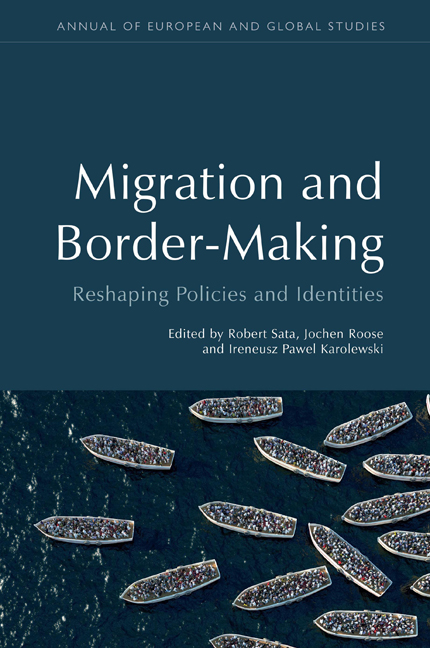Book contents
- Frontmatter
- Contents
- List of Contributors
- Introduction: Patterns and Implications of Migration and Rebordering
- 1 Do Migrants Think Differently about Migration? An Experimentum Crucis for Explaining Attitudes on Migration
- 2 Fencing in the Boundaries of the Community: Migration, Nationalism and Populism in Hungary
- 3 Rethinking Refugee Integration: The Importance of Core Values for Cultural Debate in Germany
- 4 The Unfolding of the Syrian Refugee Crisis in Turkey: From Temporariness to Permanency
- 5 The Middle Eastern Refugee Crisis and the So-Called Islamic State: Motivations of Iraqi Yazidis for Migrating to Europe
- 6 Current Migration Trends in Russia: The Role of the CIS Region Twenty Years after the Collapse of the Soviet Union
- 7 The North Amazon Border: Haitian Flow to Brazil and New Policies
- 8 Macedonian Refugees from the Greek Civil War: From Separation to a Transnational Community
- Index
6 - Current Migration Trends in Russia: The Role of the CIS Region Twenty Years after the Collapse of the Soviet Union
Published online by Cambridge University Press: 08 October 2020
- Frontmatter
- Contents
- List of Contributors
- Introduction: Patterns and Implications of Migration and Rebordering
- 1 Do Migrants Think Differently about Migration? An Experimentum Crucis for Explaining Attitudes on Migration
- 2 Fencing in the Boundaries of the Community: Migration, Nationalism and Populism in Hungary
- 3 Rethinking Refugee Integration: The Importance of Core Values for Cultural Debate in Germany
- 4 The Unfolding of the Syrian Refugee Crisis in Turkey: From Temporariness to Permanency
- 5 The Middle Eastern Refugee Crisis and the So-Called Islamic State: Motivations of Iraqi Yazidis for Migrating to Europe
- 6 Current Migration Trends in Russia: The Role of the CIS Region Twenty Years after the Collapse of the Soviet Union
- 7 The North Amazon Border: Haitian Flow to Brazil and New Policies
- 8 Macedonian Refugees from the Greek Civil War: From Separation to a Transnational Community
- Index
Summary
Introduction
THIS CHAPTER PROVIDES an overview of the migration trends in the Russian Federation from the 1990s to the 2010s in the context of the drastic change in the political, economic and social aspects of the country. Because there are few sources of data available for this period, it is difficult for researchers to derive full knowledge of the migratory processes. However, various laws were passed during the period, which indicate the architecture of the migration policy in the ‘new’ Russia. This chapter focuses on the Migration Policy Concept (hereafter: the Concept) which was adopted in 2012 as an action plan until 2025, and on criticism of it. The last part of the chapter gives an overview of the most recent adjustment of the Concept in November 2018.
The Concept is analysed in order to determine the difficulties faced in the implementation process as well as its potential for improvement. In the context of international globalisation, the importance of several factors allowing migrants to enter Russia increased: the mutual recognition of qualifications, diplomas and other educational documents; the creation of conditions for the admission of highly qualified foreign professionals in accordance with the requirements of the country’s economy; and related innovations in the field of education for the training of specialists with foreign citizenship. The Russian Federation still relies mainly on the available labour force of the Commonwealth of Independent States (CIS) countries that are specified in the articles of the Concept. In order to accommodate the diverse range of labour migrants from different countries, the chapter also provides a set of recommendations based on the findings of the Concept review. First, in order to accommodate open global migration, the information and administration connected with education must be simplified. Second, it is necessary to compile a list of professions needed for the development of the national economy and Russian society that can be open to migrants. The expansion of technological potential is directly connected to the availability of labour. In modern economies, this problem is solved with the help of not only internal potential but also the external potential of foreign employees.
- Type
- Chapter
- Information
- Transnational Migration and Border-MakingReshaping Policies and Identities, pp. 145 - 163Publisher: Edinburgh University PressPrint publication year: 2020



